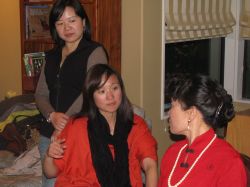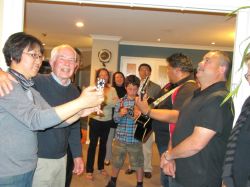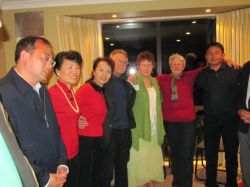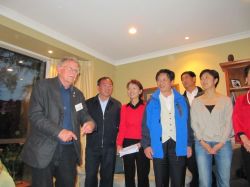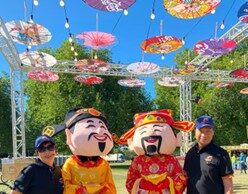Next Meeting
 Friday 2 December, 7pm Chinese Language Prize-Giving Ceremony
Friday 2 December, 7pm Chinese Language Prize-Giving Ceremony
Te Puna Wanaka (Coventry Street, off Barbadoes Street)
Christchurch Polytechnic Institute of Technology
The NZCFS commitment to encouraging the study of Chinese language is expressed by our branch in our annual prize-giving ceremony for the best students of Chinese in the primary, secondary, tertiary and community schools offering Chinese in Canterbury. It’s always a joyous evening, with families, teachers and friends enthusiastically cheering the students. This year the guest speaker will be the popular new Christchurch Consul-General Madam Tan Xiutian. Entertainment by Chinese musicians as well. Bring a friend to enjoy an inspiring event, with supper to follow.
STOP PRESS STOP PRESS
At its meeting in Wellington on Saturday 19 November, the National Executive accepted our branch’s offer to host the 2013 National conference. We are delighted! Further details to come as the months roll by!
NZCFS Photographers Tour April 2012 – 22 Days in China
Please don’t forget to promote Judy Livingstone’s photography tour as far and wide as possible. It’s going to be a great trip, and it would be a real pity if eager photographers missed, and don’t forget, this tour is for everyone, not just those who enjoy peering through the lens of a camera!
Delegation Visit
Chinmao, the Maori-China Friendship Association, hosted a ten-person delegation from the National YOUXIE office in Beijing to New Zealand during 4 – 12 November. They flew into Auckland, had two nights there and then went to Rotorua, Taupo and Wellington, before arriving here on Friday 11th . Of course being Show Week, and Friday being People’s Day, it wasn’t the best of timing from our point of view, with a lot of our branch members being out of town. However, Eric and Judy rose to the occasion and kindly opened their home for a pot luck function, and about 12 of our members welcomed our Beijing friends. The group was led by Mr Zhang Keqiang, Deputy Director General of the YOUXIE Dept of American and Oceanian Affairs. Amongst the delegation was our old friend Linda (Wang Lidan) so it was great to ‘welcome her home’ again (second time here this year)! We were also delighted that Consul General Mme Tan Xiutian, her husband Zhang Jichun and Vice Consul General Mr Wang Xinmin honoured us with their presence. As the photos show, it was a fun and enjoyable evening, with both sides singing several songs. We are delighted to be able to work closely with Chinmao on these sorts of visits, and are confident this relationship will continue to grow.
China Daily Article – Beijing’s Kids in Wonderland
Holding her favorite book The Little House by American author Virginia Lee Burton, 22-year-old Wang Miao says she has finally found her dream job – recommending and reading books to children.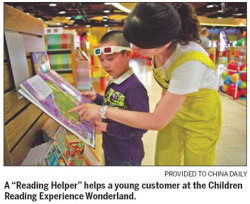
Dressed in bright yellow overalls, Wang is one of the 80 “Reading Helpers” at the Children Reading Experience Wonderland, in Beijing. Wonderland, opened in late September, specializes in books for children and is owned by China Children’s Press and Publication Group. Wang works in the section for children aged from 4 to 6. She’s a picture-book lover and enjoys sharing the stories with the young readers. Wang says she and her colleagues read more than 300 kinds of children’s books, in order to be qualified for the job.
Zhao Jun, a Beijing mother, says she got some useful tips from Wang when shopping for her 5-year-old son Yue Yue. “The Reading Helper helps me in making good choices,” the mother says. “We also discuss how to help the kids develop a reading habit.” Zhao describes the 5,000- square-meter bookstore as a “wonderland for kids”. Yue Yue, enjoys pushing around his small-sized shopping cart and adding books to it, and even goes up to the cashier himself.
The bookstore is child centered, says Wang Yang, deputy manager of Wonderland. “We believe a dedicated space for young readers is the key to fostering their interest in reading, which will greatly benefit their futures,” Wang says. Wonderland offers not only a fun reading and shopping experience for youngsters, but also plays host to a variety of activities for parents, teachers, publishers and writers, Wang adds.
The two-story Wonderland is home to 60,000 kinds of books–2,000 of which are in English–and related products, for children and youngsters aged from 0 to 18, and their parents. A
professional performing troupe will soon start to stage regular shows at Wonderland. Children, aged 4-12, can take part in performances.
Wonderland also offers education courses to parents and their children under age 6, and introduces a team of “Hearty Sisters” to offer psychological counselling to children. Other regular activities for children include making personal picture books, board game contests and book clubs. Instead of having shop assistants to help run the business, Wonderland employs a group of Reading Helpers like Wang.
Harvesting both Rain and Sun in Gansu Province, China
At the October meeting guess speaker, John Gould, who has recently returned from an International Rainwater Harvesting Training Workshop in Lanzhou, gave a presentation on an impressive project being spearheaded by the Gansu Research Institute for Water Conservancy (GRIWAC).
He described how, nestled high on the loess plateau in the arid rural heartland of central China, thousands of communities are being lifted out of poverty through a genuinely sustainable rural development programme. The roots of this initiative date back to late 1988 when GRIWAC undertook a research and extension project to improve the effectiveness of traditional rainwater harvesting systems. Initially the work focused on the upgrading of traditional household water cellars (shui jiao). These ancient underground cisterns excavated into the silty loess soils and lined with clay had been used for centuries for storing sufficient surface runoff to sustain people through the dry season. Now, using modern materials including cement, they have been upgraded into large subsurface concrete tanks. Each family will normally have two with a combined capacity of 30 – 60 cubic meters.
This improved technology provides each household with an independent and renewable water supply. The increased storage capacity also enables households to irrigate small (600-700m2) plots to produce vegetables and other crops using micro-irrigation techniques. Since water is scarce, irrigation is limited to critical periods to supplement natural rainfall. In the past, people often suffered from crop failure in drought years and were forced to walk to remote water sources when their tanks dried up. Now people have both sufficient water supply and greater food security.
Some households are now making further investments in related appropriate technologies including low-cost greenhouses and solar cookers. The simple greenhouses, typically about 40m by 7.5m, consist of a mud brick wall and bamboo or steel frame covered in durable transparent plastic sheeting. Rainwater is harvested from these structures, stored in a sub-surface tank and connected to a drip irrigation system to produce two or three cash crops (e.g., tomatoes, peppers, egg plant, cucumber, herbs), annually. These sales enable families to get a return on their US$1000 investment in as little as two years. The solar cookers consist of a parabolic dish about a meter across covered in tiny mirrors which focus reflected sunlight onto a pot or kettle. These cookers are being produced in their millions across central China and sell for around US$30. The cookers help reduce the need to cut trees for fuel wood. They also ensure that the rainwater, which is drunk mainly in the form of tea, has been boiled and is therefore pathogen free. To date this rainwater harvesting and solar cooker programme has assisted around 3 million people and provided a model for us all.
It is anticipated that a delegation from Gansu including the Director and some of the GRIWAC staff will visit Canterbury in the first half of 2012, and hopefully this will provide an opportunity for members of the NZCFS to meet them and learn more about their work.


